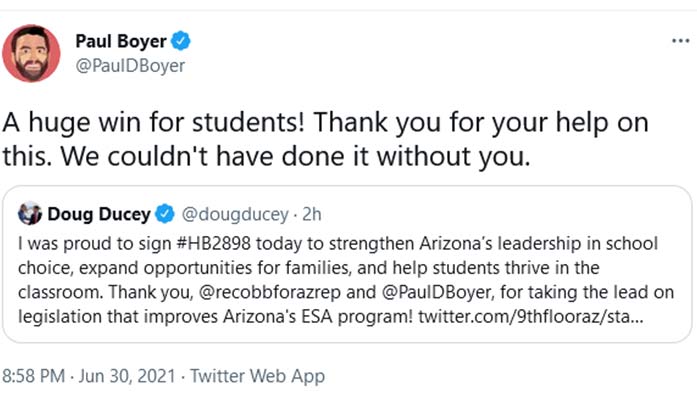By Terri Jo Neff |
The Democrats in the Arizona Legislature may have held firm on their complete opposition to the proposed K-12 budget bill, but all 47 Republicans worked through their differences in the House and Senate to get the multi-faceted House Bill 2898 to Gov. Doug Ducey’s desk Wednesday.
The major holdup with the 200-plus page HB2898 involved a Senate amendment which expanded eligibility for Empowerment Scholarship Accounts (ESAs) from about 250,000 students to more than 700,000. ESAs give credit to an eligible child for most of the government education funding that would have been paid to that student’s public or charter school.
Those funds can then be used toward expenses at private schools as well as other educational costs.
Most House Republicans supported the Senate’s amended version of the K-12 bill but opposition from Reps. Joel John (R-LD4), Michelle Udall (R-LD25), and Joanne Osborne (R-LD13) meant the House ended up approving a K-12 bill which differed from the Senate’s version.
The 16 Republican senators and 31 Republican representatives could pass any bills if they all vote together. But the differing positions on HB2898 required members of both chambers to negotiate a compromise. The result was changes to how soon certain students can qualify for an ESA, although the bill will not benefit another 450,000 students.
Rep. Bret Roberts (R-LD11) supported a larger ESA expansion in the Senate’s bill, but noted the final version still “gives parents more choices.” He added that it “brings the free market into the education system.” Meanwhile, Rep. Jake Hoffman (R-LD12) liked the “opportunities and power” the new legislation gives to parents.
Ducey signed HB2898 on Wednesday along with the 10 other bills which make up the $12.8 billion Fiscal Year 2022 budget package. The new fiscal year starts Thursday.
ESA eligibility was not the only compromise necessary to get HB2898 to Ducey’s desk. An amendment added to the bill with limited debate earlier this week mandated controversial standards for civics curriculum. It faced pushback from Sen. Paul Boyer (R-LD20). Without Boyer’s vote, the entire K-12 budget bill was in peril.
Another compromise led to removal of the last minute civics amendment and Boyer then voted for HB2898.

Other education-related bills were sent to Ducey on Wednesday, including HB2241 which requires information about the Holocaust and other genocides to be taught at least twice between grades 7 and 12. The bill passed both chambers with overwhelming bipartisan support.
The other bill, SB1572, involves early literacy policy at the State Board of Education and the Arizona Department of Education. It impacts dyslexia training and screening requirements, establishes a literacy endorsement for qualified teachers, creates an entry evaluation tool for kindergarten pupils with parental notification requirements, and mandates a K-3 Reading Program report.








